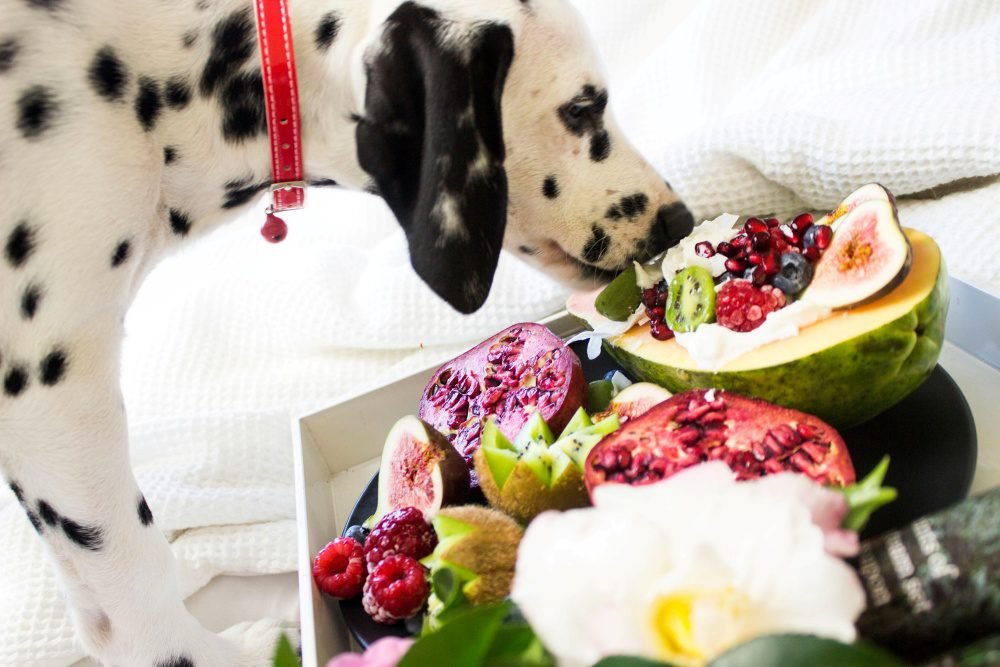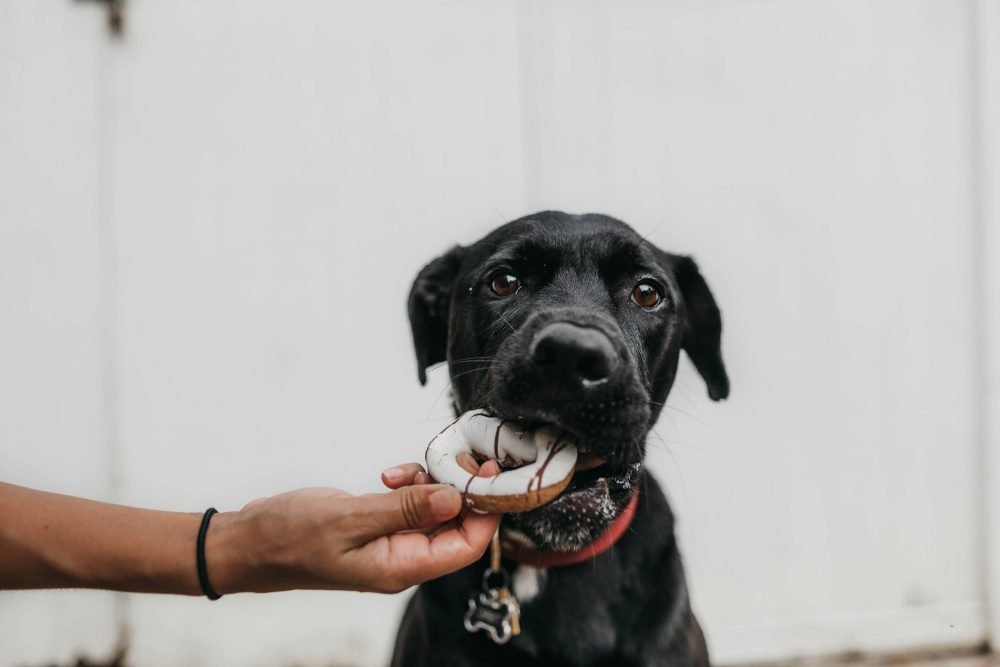We have all been there—sitting at the dining table or in the kitchen as we eat, our dogs gazing up at us with those big, pleading eyes.
From cooked vegan feasts to raw meat diets, dog owners worldwide have explored a plethora of human food options for their furry companions in order to ace the balance between moderation and nutrition to keep their dogs healthy.
However, not all human foods are safe for dogs. In fact, some can be downright dangerous, which means understanding which food items typically meant for humans can be shared safely is crucial for their health and well-being.
So, what can you safely share with your canine companion, and what foods should stay strictly on your plate?
What Fruits Dogs Can and Cannot Eat
Dogs can enjoy a variety of fruits as part of a balanced diet. However, caution is necessary when it comes to those with pits and seeds, which can not only be a choking hazard but may also contain cyanide.
Besides these considerations, the main thing to remember is moderation due to the relatively high sugar content in most fruits.
Here is a breakdown of fruits that your furry friends can eat and those you had wanted to keep away from them:
1. Can Dogs Eat Mango?
Absolutely, mangoes can be a vitamin and fibre-rich treat for dogs when prepared correctly. Make sure to peel the mango and carefully remove the pit to avoid any choking hazards or digestive problems.
2. Can Dogs Eat Strawberries?
Absolutely, strawberries are a great choice for dogs, providing low-calorie nutrition and a healthy dose of antioxidants and fibre. As a bonus, the natural enzymes in strawberries can help keep your dog’s teeth clean, making those dog teeth cleaning services a whole lot easier.
However, make sure to cut them into small pieces to avoid choking risks. And like all fruits, strawberries contain sugar, so they should be given as a treat, not a diet staple.
3. Can Dogs Eat Oranges?
Yes. oranges can be a refreshing, vitamin-rich treat for dogs, but they should be given in moderation. While nutritious, the acidic nature of oranges might upset some dogs’ stomachs, so it is wise to start with small amounts. Remove all seeds and peel the fruit before offering it to your pet.
4. Can Dogs Eat Bananas?
Yes, bananas are a beneficial snack for dogs in moderation. High in potassium and other vitamins, they provide a healthy boost. However, due to their sugar content, they should remain a treat rather than a regular part of your dog’s diet.
5. Can Dogs Eat Blueberries?
Yes, blueberries are an excellent choice for dogs. These small fruits are loaded with antioxidants and vitamins that support your dog’s health. Plus, they are low in calories and make for a convenient, tidy treat.
6. Can Dogs Eat Pears?
Yes, pears are safe when prepared correctly. Rich in fibre and vitamins, pears also make a nutritious snack. Ensure that the pit and seeds are removed first, as they contain traces of cyanide, and always serve in manageable pieces to prevent choking.
7. Can Dogs Eat Durian?
Dogs can have durian in very small amounts. The flesh of the durian can be a tasty treat, but the seeds must be avoided as they are toxic and can cause intestinal blockage. Always monitor your dog’s reaction to new foods like these.
8. Can Dogs Eat Tomatoes?
Depends. Tomatoes are generally safe for dogs if they are fully ripe and fed in moderation. However, the green parts of the tomato plant—such as the leaves and stems—and unripe tomatoes contain solanine (a glycoalkaloid poison), which can be toxic to dogs when consumed in large quantities.
9. Can Dogs Eat Watermelon?
10. Can Dogs Eat Papaya?
Yes, dogs can safely enjoy papaya as it is full of nutrients that are beneficial to them. Just make sure to peel the fruit and remove the seeds, as they can be hazardous.
11. Can Dogs Eat Grapes?
Absolutely not—grapes and raisins are highly poisonous to dogs, leading to serious kidney issues and potentially fatal outcomes. It is imperative to keep these fruits out of your dog’s reach.
12. Can Dogs Eat Dragon Fruit?
Yes, dragon fruit is safe and beneficial for dogs, offering hydration and a variety of vitamins. Ensure it is served in small, manageable pieces to prevent any choking risk.
13. Can Dogs Eat Cucumbers?
Certainly, cucumbers are a hydrating vegetable that can be a low-calorie treat for dogs, perfect for aiding in weight management. However, introduce cucumbers into your dog’s diet gradually to ensure they digest it well.
14. Can Dogs Eat Kiwi?
15. Can Dogs Eat Guava?
Yes, guava can be eaten by dogs in small amounts as an occasional treat. It is packed with vitamins but also sugars, so moderation is key.
16. Can Dogs Eat Pineapple?
17. Can Dogs Eat Apples?
Yes, apples are excellent for dogs when seeds and core are removed. They offer fibre and vitamins, making them a good snack option.
18. Can Dogs Eat Peaches?
Peaches can be a tasty summer treat for dogs when the pit is removed. They offer nutritional benefits but should be fed in moderation due to their sugar content.
19. Can Dogs Eat Avocado?
No, avocados are off-limits for dogs because they contain persin, an oil-soluble fungicide that is harmful and can lead to significant health problems.
20. Can Dogs Eat Cherries?
Dogs can eat the flesh of cherries in moderation, but the pits and stems must be removed due to cyanide content and choking hazards.
21. Can Dogs Eat Honeydew?
Yes, dogs can enjoy honeydew melon when seeds and rind are removed. It is full of vitamins and mostly water, making it a refreshing, hydrating snack.
What Vegetables Dogs Can and Cannot Eat

Vegetables can be a healthy addition to your dog’s diet, but like fruits, they should be given in moderation. They should not be consumed excessively as doing so can alter gut flora or increase alkalinity, potentially leading to kidney issues.
22. Can Dogs Eat Corn?
Yes, dogs can enjoy corn as a treat. It is safe for your dog to have a small amount of corn kernels removed from the cob. While corn is not harmful, it is high in sugar and should be given in limited quantities to avoid overfeeding.
23. Can Dogs Eat Sweet Potatoes?
Absolutely. Sweet potatoes are beneficial due to their high vitamin A content, which supports vision and immune health in dogs. However, due to their potent vitamin A concentration, it is important to give these in moderation to avoid potential issues with your dog’s bones and muscles.
24. Can Dogs Eat Mushrooms?
Store-bought mushrooms like portobellos are safe for dogs if served plain and without any added harmful ingredients like onions or garlic. Be cautious with wild mushrooms, as many are toxic and can cause severe reactions.
25. Can Dogs Eat Broccoli?
Yes. Broccoli is safe when consumed in small quantities as an occasional treat. It is low in calories and rich in nutrients but contains isothiocyanates, which can cause gastric irritation in large amounts. Therefore, it is best served sparingly.
26. Can Dogs Eat Cabbage?
Cabbage is healthy for dogs and can aid in digestion and skin health. However, it can cause gas, so it is important to introduce it slowly into their diet in small amounts to assess tolerance.
27. Can Dogs Eat Cauliflower?
Depends. Cauliflower can be a healthy treat for dogs when given in small amounts, but it may not suit dogs with sensitive stomachs as it can lead to gas and discomfort.
28. Can Dogs Eat Garlic?
No. Garlic should be strictly avoided in a dog’s diet as it is extremely harmful. The thiosulfates found in garlic can destroy red blood cells, potentially causing anaemia. Signs of garlic toxicity in dogs may manifest as vomiting and diarrhoea, with severe cases possibly necessitating a blood transfusion.
29. Can Dogs Eat Onion?
Absolutely not. Onions are highly toxic to dogs and can lead to severe health complications, including anaemia. Every part of the onion—whether raw, cooked, or in powdered form—is poisonous to dogs. Signs of onion toxicity may range from lethargy and weakness to fainting, and severe cases might necessitate emergency veterinary care.
Other Common Human Foods
Beyond the aforementioned, there might be other foods that you might have thought of sharing with your furry friends. Some of these can safely be part of your dog’s diet, while others could be harmful.
Consider the following:
30. Can Dogs Eat Cheese?
Yes, cheese can be a tasty treat for dogs in small amounts. However, due to its lactose and fat content, some dogs might experience mild digestive upset. Introduce cheese gradually into your dog’s diet, and opt for low-fat varieties like mozzarella to minimise any adverse effects.
31. Can Dogs Eat Bread?
Bread can typically be a safe snack for dogs when given in moderation. Opt for simple varieties such as plain white or whole wheat, which are less likely to cause stomach issues. However, it is crucial to check that the bread doesn’t include harmful additives like raisins or xylitol, which can be toxic to dogs.
32. Can Dogs Eat Eggs?
Yes. Eggs can be a great source of protein for dogs and can be eaten hard-boiled or scrambled with or without the yolk, but make sure they are fully cooked. Avoid raw eggs to prevent the risk of salmonella and to ensure easier digestion for your dog.
33. Can Dogs Eat Peanuts?
Depends. Unsalted, unseasoned peanuts are a safe occasional treat for dogs. Ensure peanuts are given in moderation and avoid any that are prepared with additives like salt or flavourings. Never give dogs peanut products containing xylitol, which is toxic to them.
34. Can Dogs Eat Yoghurt?
Yoghurt is safe for dogs to consume, yet many canines have difficulty processing lactose, which could lead to digestive discomfort. If you decide to feed your dog yoghurt, it is best to use plain, unsweetened varieties and introduce it slowly in small portions to see how your dog handles it.
35. Can Dogs Eat Prawns?
Yes. Prawns can make for a delicious and safe snack for dogs when thoroughly cooked and offered in controlled amounts. It is crucial to peel the prawns to eliminate any choking hazards and make sure they are prepared without any dog-toxic ingredients like garlic or onions.
36. Can Dogs Eat Tofu?
In moderation. Tofu can be given to dogs as an occasional treat, but it should not replace protein sources in their diet that are more biologically appropriate for them.
37. Can Dogs Eat Rice?
Yes. Rice is a good option for dogs, especially when they tend to have an upset stomach. It is easy to digest and low in fibre. It can also be a part of a balanced meal, especially when cooked and mixed with some lean protein.
38. Can Dogs Eat Ice Cream?
Generally, it is best to avoid giving dogs ice cream. Most dogs are lactose intolerant, and ice cream can lead to digestive upset. Additionally, many ice creams contain sugars and flavours that are not suitable for dogs.
39. Can Dogs Eat Chocolate?
Absolutely avoid giving your dog chocolate. It contains caffeine and theobromine, both of which are harmful to dogs and can cause critical health problems or even be fatal. All forms of chocolate are hazardous, especially dark chocolate, which is more potent and dangerous for dogs.
40. Can Dogs Eat Egg Shells?
Eggshells can provide a beneficial calcium boost to your dog’s diet. To safely incorporate them, thoroughly boil the shells to remove any bacteria, such as salmonella and then grind them into a fine powder. This prevents any sharp fragments from causing harm to your dog’s gastrointestinal system.
Dangerous Foods That Should Always Be Avoided
Always keep these foods out of your dog’s reach and consult your vet immediately if ingestion occurs.
Toxic and Potentially Fatal Foods
- Alcohol: Can cause intoxication, coma, and death.
- Chocolate, Coffee, and Caffeine: Contains theobromine and caffeine, toxic to dogs.
- Grapes and Raisins: Can cause kidney failure.
Foods with Hazardous Components
- Avocado: Contains persin, harmful, especially in large quantities.
- Fruits with Pits and Seeds (Apples, Cherries, Apricots, Plums): Pits and seeds can cause choking or contain cyanide.
- Onions, Garlic, Chives, and Leeks: Contain substances that can lead to anaemia.
High-Risk Foods
- Dairy Products: Lactose intolerant or dogs with allergies might experience digestive upset.
- Fatty Foods (like bacon, fatty meat cuts, and skin): Can cause pancreatitis.
- Macadamia Nuts and Other Nuts: Can be toxic or cause choking.
- Xylitol: Can cause liver failure and hypoglycemia.
Foods That Can Cause Discomfort or Illness
- Raw Meat and Eggs: Risk of Salmonella or E. coli.
- Bones: Might potentially splinter into sharp pieces that might perforate internal tissues or obstruct the digestive tract.
- Salty Foods: Excessive consumption can cause dehydration, increased thirst and urination, and potentially sodium ion poisoning.
Now, while sharing your meal with your furry friend can be a bonding experience, it is crucial to know which foods are safe and which pose risks. By educating yourself on these dietary dos and don’ts, you can ensure your dog enjoys a variety of safe foods and maintains a healthy diet, keeping those wagging tails up and thriving.
Get Help from The Gentle Vet


